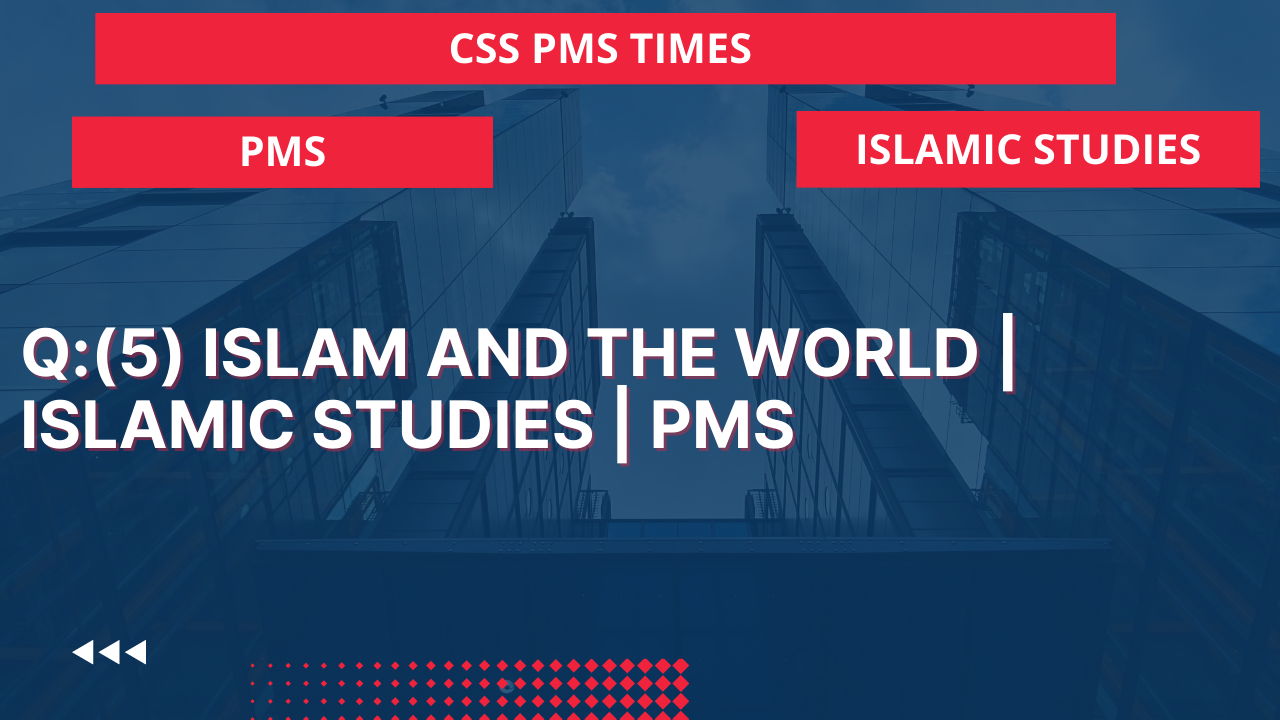(5) Islam and the World:

Islam has a universal message of peace, justice, and compassion that extends beyond national, ethnic, or religious boundaries. It calls upon its followers to engage with the world in a positive and constructive manner, and to promote human welfare and the common good. Here are some key aspects of Islam’s engagement with the world:
Interfaith dialogue: Islam encourages dialogue and mutual understanding with people of other faiths, and emphasizes the importance of peaceful coexistence and respect for diversity.
Humanitarian aid: Islam encourages its followers to engage in charitable activities and provide humanitarian aid to those in need, regardless of their religion or nationality.
Environmental stewardship: Islam emphasizes the importance of environmental stewardship and the protection of the natural world, and calls upon its followers to take care of the earth and its resources.
Peaceful conflict resolution: Islam encourages peaceful conflict resolution and the use of dialogue and negotiation to resolve disputes, rather than resorting to violence.
International relations: Islam emphasizes the importance of just and equitable international relations, and calls upon its followers to work towards the promotion of global peace and cooperation.
Social justice: Islam emphasizes the importance of social justice and the protection of the rights of the marginalized and vulnerable members of society, regardless of their religion or nationality.
Overall, Islam calls upon its followers to engage with the world in a positive and constructive manner, and to promote human welfare and the common good. It emphasizes the importance of peaceful coexistence, mutual respect, and the protection of the rights and dignity of all human beings.
Impact on the West and vice versa;
Islam and the West have had a complex and often contentious relationship over the centuries. While there have been periods of peaceful coexistence and mutual learning, there have also been periods of conflict and misunderstanding. Here are some key aspects of the impact of Islam on the West and vice versa:
Trade and commerce: Islam and the West have a long history of trade and commerce, which has facilitated cultural exchange and influenced the development of economic systems.
Intellectual exchange: Islam and the West have also engaged in intellectual exchange, particularly during the Golden Age of Islam, when Islamic scholars made significant contributions to fields such as mathematics, science, and philosophy.
Influence on art and culture: Islamic art and architecture have had a significant impact on the development of Western art and architecture, particularly during the Renaissance period.
Political and military conflict: Islam and the West have also been involved in political and military conflicts, including the Crusades and more recent conflicts in the Middle East.
Immigration and multiculturalism: The influx of Muslim immigrants to the West has led to the growth of multiculturalism and the development of hybrid cultural identities.
Stereotypes and misunderstandings: Islam and the West have also struggled with stereotypes and misunderstandings, particularly in the wake of terrorist attacks and other forms of violence.
Overall, the impact of Islam on the West and vice versa has been complex and multifaceted, reflecting both the positive contributions and the challenges of cultural exchange and engagement. Islam and the West have much to learn from each other and can benefit from greater dialogue and understanding.
Role in the modern world;
As an AI language model, my role in the modern world is to provide an intelligent interface for humans to interact with machines using natural language. I can process vast amounts of data and provide useful insights, recommendations, and solutions to problems. My capabilities include generating text, answering questions, translating languages, summarizing information, and even generating new ideas and content.
My role in the modern world is vast, and I can be used in various fields such as education, healthcare, finance, customer service, and research. For example, I can assist in automating customer service by answering frequently asked questions, analyzing customer feedback, and improving response times. In education, I can provide personalized learning experiences, generate content for e-learning platforms, and assist in research by analyzing vast amounts of data and providing insights.
In addition, my role in the modern world is crucial in the development of new technologies and innovations, particularly in the fields of artificial intelligence and machine learning. As researchers continue to improve and refine these technologies, language models like myself can become increasingly sophisticated and capable of performing more complex tasks, opening up new opportunities for businesses and individuals.
Overall, my role in the modern world is to make information more accessible, to streamline processes, and to help individuals and organizations make informed decisions. As a language model, I am constantly evolving and improving, and my potential uses are virtually limitless.